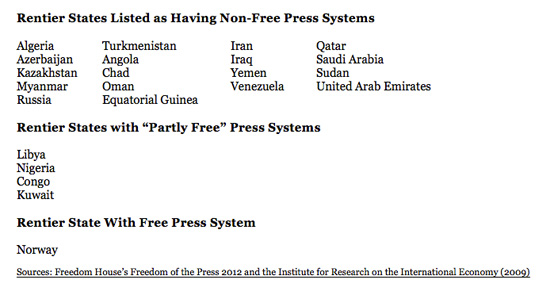Doha, Qatar—The rent goes up, the democracy goes down, or so they say. This small Arab Gulf nation is what political scientists refer to as a rentier state, generally defined as a government that receives at least 40 percent of its revenue from the export of primary products, often fuel—the collection of foreign “rents.”
Qatar’s crude oil will likely dry up not long after 2020, but the nation of nearly two million people sits atop 14 percent of the world’s proven natural gas reserves, which could generate valuable energy sales for another 200 years.
It is indisputable that most rentier states—such as Venezuela, Saudi Arabia, and Qatar—are not functioning democracies. But some political scientists disagree as to whether natural resource wealth is a primary muzzler of democracy. In the Middle East, for example, some researchers argue that other factors, say, religious conservatism in Saudi Arabia, better explain democratic stagnation. And furthermore, plenty of non-rentier states, such as Belarus and North Korea, are not democratic, while at least one rentier state, Norway, is strongly so.
Nevertheless, most political observers concede that, at the very least, vast natural resource wealth does not tend to move democracy along.
And so it is with journalism.
Free speech and free journalism in rentier countries are not doing so well. If one looks at the list of 23 countries classified by the Institute for Research on the International Economy as host to rentier economies, Norway is the only country listed that is also among nations Freedom House lists as having robust press protections. What’s more, the list of rentier economies includes some of the most brutal oppressors of speech assessed in Freedom House’s 2012 index, such as Iran and Turkmenistan. Even most of the rentier states Freedom House tags as “partly free”—Libya, Congo, and Nigeria—are largely journalistic hardship posts.

Along with categorizing nations’ press systems as “free,” “partly free,” or “not free,” Freedom House assigns each country a world ranking for press freedom. In 2012, the range of rankings for non-free press systems ranged from Algeria (ranked 139 in the world) to North Korea (ranked 197). The median press freedom ranking for rentier states, excluding Norway, is 167. This means that half of rentier countries are ranked between 167th and 197th in the world. Rentier states don’t just frustrate speech; many of them extinguish it.
The reader will notice that rentier countries listed here are clustered in a number of geographical regions: Middle East/North Africa, Eastern Europe/Central Asia, and Sub-Saharan Africa. For this reason, again, some political scientists argue that regional political trends, more than rentier wealth in the hands of consolidated regimes, predict political petrification.
Still, I’m reasonably persuaded that rentier wealth suppresses political reform. I’ve visited Kuwait and Qatar multiple times in the last four years and have been exposed to almost zero political stirrings. A 2008 study in the American Political Science Review found a relationship between countries’ oil rents and inadequate rights for women. “The extraction of oil and gas tends to reduce the role of women in the workforce, and the likelihood they will accumulate political influence,” wrote author Michael Ross. And with lower numbers of working women, “patriarchal institutions will go unchallenged,” he wrote.
Powerful institutions in rentier states often go unchallenged by local journalists, too. Governments that function via external rent, rather than popular consent and taxes, often have the luxury of not answering to their people—or to journalists who ask questions on their behalf. There is a “widespread assumption in studies of political economy that for a nation to [primarily] depend for its wealth on its natural resources is at best a mixed blessing and at worst a…nearly impenetrable roadblock to democratization,” Allen Fromherz wrote in his 2012 book, Qatar: A Modern History.
Of course, there are plenty of journalistic nuances that aren’t always evident in press freedom indices like those from Freedom House or Reporters Without Borders. In Qatar, for example, journalists are often free to boldly report on the governments of other countries, but may not cross the royals in Doha. Most daily newspapers in Kuwait are privately owned and can be quite vocal. Dailies in the United Arab Emirates are owned mostly by well-heeled royals and stirred by their silver spoons, but there are free speech protections for foreign media organizations operating from, say, Dubai.
Nuance aside, stifled speech tends to be the rule in the world’s rentier economies, and robust press protections a narrow exception. Rent-rich governments tend to host media systems that are free-speech poor.
Justin D. Martin is a journalism professor at Northwestern University in Qatar. Follow him on Twitter: @Justin_D_Martin
